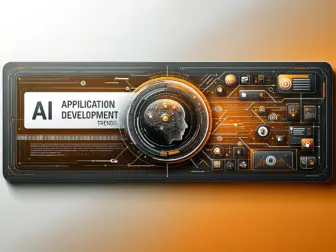Tag - AI application development trends 2024
Exploring the Future: AI Application Development Trends 2024
As we approach the year 2024, the world of technology is evolving at a rapid pace, with artificial intelligence (AI) at the forefront of innovation. AI application development is expected to see significant advancements and trends that will shape the industry in the years to come. Let’s take a closer look at some of the key trends that are predicted for AI application development in 2024.
1. Continued Growth of AI in Various Industries
AI is already being widely used across a range of industries, from healthcare to finance to retail. In 2024, we can expect to see even more industries incorporating AI into their operations. This will lead to the development of more specialized AI applications tailored to the specific needs of different sectors. For example, we may see the rise of AI-powered tools for personalized healthcare, predictive maintenance in manufacturing, and AI-driven customer service in retail.
2. Increased Focus on Ethical AI Development
As AI continues to play a bigger role in our daily lives, concerns around ethics and bias in AI systems have become more pronounced. In 2024, there will be a greater emphasis on developing AI applications that are ethical, transparent, and fair. This will involve implementing strict guidelines for data privacy and security, as well as ensuring that AI algorithms are free from bias and discrimination. Companies will need to prioritize ethical considerations in their AI development processes to build trust with users and regulators.
3. Rise of AI-Driven Automation
Automation has long been a key benefit of AI technology, but in 2024 we can expect to see even greater levels of automation driven by AI applications. From chatbots and virtual assistants to robotic process automation (RPA) tools, AI-powered automation will become more sophisticated and prevalent across various industries. This will lead to increased efficiency, cost savings, and improved productivity for businesses that adopt AI-driven automation solutions.
4. Integration of AI with Other Emerging Technologies
AI is not operating in isolation – it is increasingly being integrated with other emerging technologies to create more powerful and innovative solutions. In 2024, we can expect to see AI applications that leverage technologies such as blockchain, Internet of Things (IoT), and edge computing to deliver new capabilities and functionalities. For example, AI-powered smart contracts in blockchain, AI-driven predictive maintenance in IoT devices, and AI algorithms running on edge devices for real-time processing.
5. Focus on Explainable AI and AI Model Interpretability
One of the challenges with AI technology is its “black box” nature, where decisions made by AI algorithms are often difficult to interpret or explain. In 2024, there will be a growing focus on developing explainable AI and improving AI model interpretability. This will involve creating AI applications that can provide transparent explanations for their decisions, as well as tools and techniques to help users understand and trust AI-driven recommendations. Explainable AI will be crucial for gaining user acceptance and regulatory approval for AI applications in various industries.
6. Democratization of AI Development
As AI technology becomes more accessible and user-friendly, we can expect to see a democratization of AI development in 2024. This trend will enable a broader range of users, including non-experts and smaller businesses, to create and deploy AI applications without requiring advanced technical skills. With the help of low-code and no-code AI development platforms, more people will be able to harness the power of AI to drive innovation and solve real-world problems. This democratization of AI development will democratize access to AI technology and expand its impact across different sectors and industries.
7. Enhanced Security and Privacy in AI Applications
Security and privacy have always been major concerns in the technology industry, and AI applications are no exception. In 2024, there will be a heightened focus on enhancing security and privacy in AI applications to protect sensitive data and prevent cyber threats. This will involve implementing robust security measures, such as encryption, authentication, and access controls, to safeguard AI models and data. Additionally, privacy-preserving AI techniques, such as federated learning and differential privacy, will be more widely adopted to ensure that personal data is protected in AI applications.
8. Shift towards Edge AI and Federated Learning
Edge computing and federated learning are emerging trends that are shaping the future of AI application development. In 2024, we can expect to see a shift towards deploying AI models on edge devices, such as smartphones, IoT sensors, and drones, to enable real-time processing and inference. This will reduce latency, improve privacy, and enhance scalability for AI applications. Additionally, federated learning will gain momentum as a decentralized approach to training AI models
